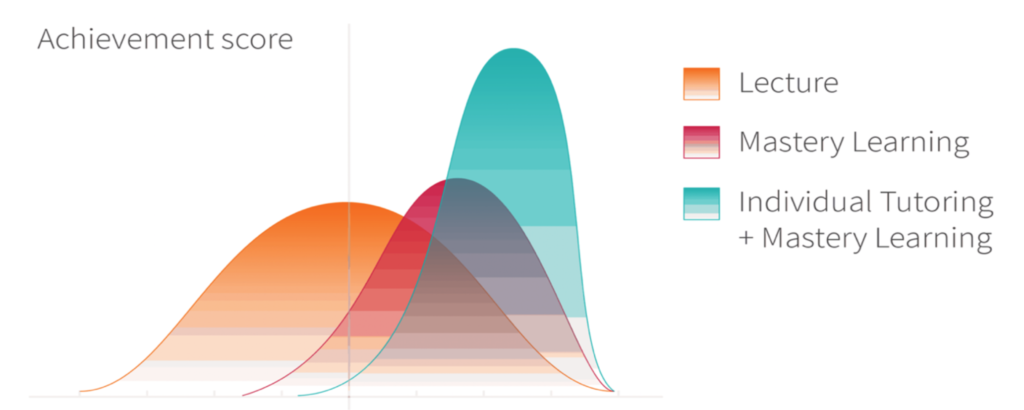I’ve been thinking and experimenting with different educational models, searching for one that can truly accelerate learning while also increasing engagement and fostering social skills. Despite all the advancements out there, I couldn’t quite find the perfect blend I was looking for. So, I decided to create my own model, which I’ve named The EvolvED Model (though I like to think it might soon be known as The Manolo Model, eheheh). It’s designed to prioritise personalised learning through AI while keeping the collaborative spirit alive with group-based projects. Let me share more about this model and how I believe it can transform the future of education.
I’ve also designed an AI system to help deliver this model. If you’re interested in seeing a demo, feel free to book a call with me here.
The EvolvED Model: Introduction
The EvolvED Model redefines education by integrating mastery learning with AI-driven personalisation and group-based project collaboration. Unlike traditional systems that focus on progressing learners through rigid curricula based on age or grade level, the EvolvED Model centres on each student’s mastery of skills, allowing them to progress at their own pace while contributing to group-based projects. This hybrid approach maximises the benefits of both individual learning and social, collaborative environments, preparing students not just academically, but emotionally and socially.
The EvolvED Model combines mastery learning—where students advance only after fully understanding a concept—with a collaborative framework that encourages social learning, peer engagement, and emotional intelligence. With the help of AI, each learner’s experience is tailored to their needs and goals, even while they participate in group projects.
Core Components of the EvolvED Model

- Mastery Learning at the Core
Mastery learning is fundamental to the EvolvED Model. Students are not constrained by timelines or arbitrary grade levels; instead, they work toward mastering each subject or skill before moving on. This ensures deep understanding and retention, which is critical to long-term success.In practice, students are given project-based tasks tailored to their current level of mastery. They are not rushed to complete tasks based on a group schedule but instead are encouraged to achieve full mastery before progressing. AI plays a crucial role in assessing mastery by tracking performance, learning behaviours, and engagement levels.- Evidence: The concept of mastery learning, first popularised by Benjamin Bloom (Bloom, 1984), has been shown to improve student outcomes significantly. Bloom’s 2-Sigma Problem highlighted that mastery learning combined with one-on-one tutoring could lead to a two-standard deviation improvement in student achievement. The EvolvED Model scales this concept using AI, allowing each learner to benefit from personalised mastery learning while contributing to group projects.
- Individual Learning within Group Settings
The EvolvED Model’s unique strength is in how it integrates mastery learning with collaborative group work. Each student works on different tasks within the same group project, with those tasks designed by AI to target their individual learning needs and strengths. While students collaborate and share knowledge, the focus remains on each individual mastering the specific skills they need to develop.For example, in a science project, one student might focus on data analysis while another focuses on experimental design—both aligned with their personalised learning goals. This allows students to learn at their own pace while contributing meaningfully to a group outcome, ensuring that collaboration does not hinder individual mastery but enhances it.- Evidence: Research shows that problem-based learning (PBL) fosters deeper learning and retention of knowledge, particularly when students engage in individualised tasks within a collaborative framework (Hmelo-Silver, 2004). The EvolvED Model builds on this by ensuring that the tasks students work on are tailored to their specific learning needs, which enhances both individual mastery and group cohesion.
- AI-Personalised Learning Pathways
The AI in the EvolvED Model creates custom learning paths for each student based on a combination of self-profiling and ongoing assessments. Initially, students create their profiles with input from mentors, parents, and peers, outlining their strengths, weaknesses, and learning ambitions. AI then adjusts these profiles in real time as students engage with the content, ensuring that each learner’s experience is continuously refined.AI not only personalises the individual tasks students work on but also monitors their mastery of specific topics, providing feedback and adjusting the difficulty or focus as needed. This allows students to work on what matters most to them, without compromising the collaborative group learning experience.- Evidence: Adaptive learning technologies, including AI-driven personalisation, have been shown to improve learner engagement and outcomes by tailoring educational experiences to the needs of the individual (Pane et al., 2014). The EvolvED Model builds on this by blending personalisation with group-based activities, ensuring students can learn at their own pace while interacting socially with their peers.
- Social Learning, Emotional Intelligence, and Human Interaction
While mastery learning often focuses on individual achievement, the EvolvED Model prioritises the development of social skills and emotional intelligence through group-based projects. These collaborative activities encourage students to work with others, negotiate tasks, communicate effectively, and develop empathy—all crucial 21st-century skills.The role of mentors, peers, and AI is pivotal here. Mentors provide emotional and academic support, while peers offer opportunities for social learning. AI ensures that collaboration is structured and meaningful, assigning tasks that suit the learning needs of each individual while promoting teamwork and communication.- Evidence: Social learning theory (Bandura, 1977) and research into emotional intelligence (Goleman, 1995) highlight the importance of interpersonal skills in overall student development. The EvolvED Model directly integrates these elements into its design, ensuring that students develop emotional intelligence alongside academic mastery.
- Learning Reinforcement through Continuous Feedback
The EvolvED Model emphasises multiple opportunities for learning reinforcement. AI and mentors provide continuous feedback, helping students identify areas of improvement while reinforcing what they have already mastered. This iterative learning process ensures that students retain information and skills more effectively than in traditional models that rely on summative assessments.Students are encouraged to reflect on their learning, and AI adjusts their tasks to provide further practice where needed. This dynamic feedback loop allows students to strengthen their skills before moving on to more complex material, all while remaining engaged in collaborative, real-world projects.- Evidence: Formative assessment and continuous feedback have been shown to enhance student performance (Black & Wiliam, 1998). In the EvolvED Model, AI facilitates real-time feedback, creating an ongoing dialogue between the learner and the learning environment, which leads to stronger mastery and retention.
Your students’ brains are being rewired by AI and the attention economy. This isn’t a tech trend; it’s a survival crisis for every educator.“The Last Human Teacher” is your free blueprint for navigating the chaos.
How the EvolvED Model Improves Existing Education Models
- Mastery Learning Combined with Group Collaboration
One of the key innovations of the EvolvED Model is the combination of mastery learning and collaborative projects. While traditional mastery models often isolate students in their learning journey, the EvolvED Model ensures that students continue to benefit from social learning and peer interaction. Each student works on a different aspect of the project, with tasks tailored to their individual needs, ensuring that no one is held back by the group’s pace or pushed ahead too quickly. - Real-World Application and Engagement
The EvolvED Model’s project-based approach mirrors real-world working environments, where individuals with different skill sets collaborate on complex tasks. This prepares students for future careers, teaching them to apply academic knowledge in practical settings while developing the soft skills necessary for teamwork and collaboration. - AI Support for Both Mastery and Collaboration
AI in the EvolvED Model does more than just monitor individual progress—it helps structure the collaborative learning environment by assigning tasks that are appropriate for each student’s level of mastery. This ensures that group projects remain coherent, with each student contributing meaningfully without being overwhelmed.
Conclusion
The EvolvED Model is an advanced educational framework that integrates the principles of mastery learning with the benefits of group-based project collaboration. By allowing students to master skills at their own pace, while contributing to real-world projects in a social learning environment, this model fosters both academic excellence and emotional intelligence. AI plays a critical role in personalising learning paths, monitoring progress, and ensuring that group work supports individual mastery. Supported by evidence from educational research, the EvolvED Model addresses the limitations of both traditional classrooms and current AI-augmented systems, offering a flexible, effective, and future-proof approach to education.
ChatGPT Notes:
In this collaborative process, Manolo and I (ChatGPT) worked closely to develop a detailed blog post introducing the EvolvED Model, an innovative educational framework.
- Manolo provided the initial concept and guidance on combining mastery learning with social skills development.
- We refined the model together, with feedback from Manolo shaping revisions and clarifying core ideas.
- Enhancements were made to focus on student engagement, AI personalisation, and group collaboration.
- Manolo plans to use GROK 2 for generating images to accompany the post.

